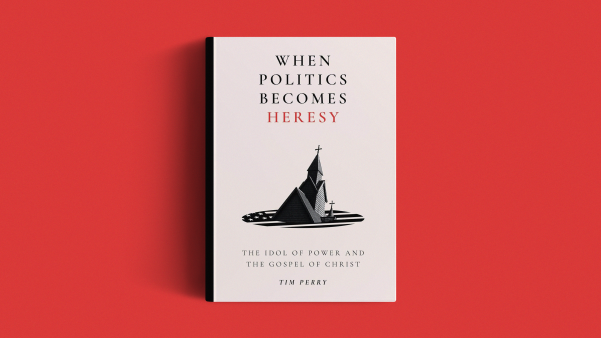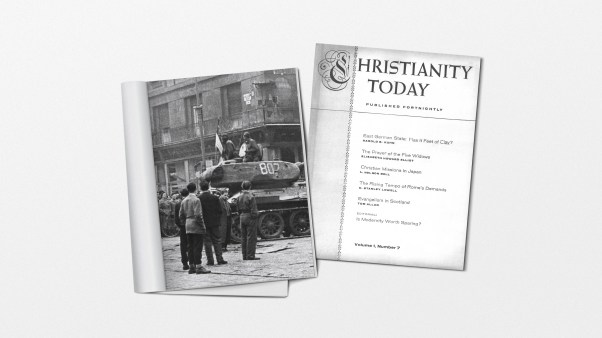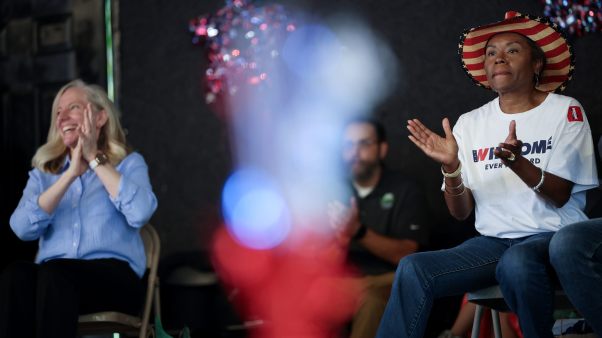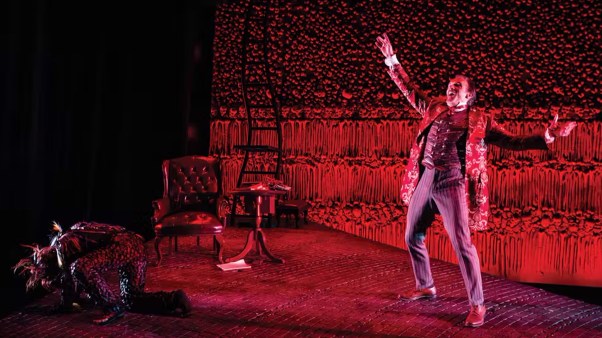I knew a pastor—he's gone now—who was dearly loved by his congregation. From the children to the elderly in the church, there was a universal affection and respect for this man.
When I asked one of his church members why their pastor was so highly regarded, she said, "We love him because he's a peaceful leader."
'Are you a peaceful leader who touches people, or a visionary who uses them?'
Asked to define peaceful leader, she said, "Read Psalm 23 and you get a picture of a peaceful leader and a secure flock. Green pastures, quiet waters, refreshed souls, correct paths, care in the moment of danger. That's the evidence of a peaceful leader."
Soon after that exchange, I talked with my pastor-friend and related what I'd heard. Had he always been like that, I asked? A peaceful leader?
His answer: "Peaceful? Not at all. When I began my ministry, I thought my work was all about big vision, sizable crowds, impressive programs. I constantly pressed the people for more of this, more of that. For a while the people loved it. But would they have called me a peaceful leader? No way."
"What changed?"
"Well, one day I had two unexpected, very painful encounters that forced me to see myself through the eyes of others.
"The first occurred when I visited a family from our church. As I pulled up to their home, I saw the family's youngest child, a girl maybe 5 years old, playing in the front yard. I said to her, 'Could you go inside and tell your mommy and daddy that the pastor is here?'
"She ran for the house," he went on, "and when she got inside, I heard her yell, 'Mommy, Mommy, the angry man who shouts in church is here.'
"Her words shook me. To her I was an angry man, a shouter. That's not a peaceful leader. Was that what I wanted children to think of me?
"Then, a few hours later, I bumped into an elderly couple at church. I began talking about a new building project we were considering. Suddenly the husband interrupted me: 'Pastor, can you take a thought from an old man?'
"'Of course,' I said, thinking he was going to say something nice about me.
"'I sometimes wonder if there's a quiet part in you,' he said.
"'A quiet part'? What do you mean?
"'Every time we see you, you seem all wound up, talking about projects and programs. You speak of Jesus only in your sermons, not in conversations. Maybe some people like that. But we're up in years, and we'd like to know that our pastor has a quiet side where Jesus whispers into his life for the benefit of others.'"
Peaceful leaders offer a fresh view of jesus because he is embedded in their character.
My friend paused and then said: "Two powerful rebukes in two hours. A little girl who thought I was a shouter and an old man who didn't see much of Jesus in me. When I told my wife what had happened, she said, 'Maybe Heaven is speaking through those two. Perhaps it's time to think about the kind of leader you're becoming. Are you becoming a peaceful leader who connects with people or an organizational leader who uses them?'"
Then my pastor-friend said to me, "If what you say has any truth to it—that now I am perceived as a peaceful leader—that was the day things began to change. A child and an old man started the ball rolling."
That conversation happened many years ago, and the memory of it returned the other day when I watched a small boy on TV approach Pope Francis, wrap his arms around the Holy Father's legs, and receive an affectionate pat on his head. Then the child climbed up on the papal throne as if it were his to own. What did this child sense about the Pope that caused him to feel free to do that?
I thought of the young school teacher in the Oklahoma tornado who gathered her class in a small interior closet and in the most frightening moments kept telling the children, "It's almost over; it's almost over."
Then there was the teacher during the Newtown, Connecticut, school shootings who kept saying to her children—also in a closet—"I love every one of you; I love every one of you." Later she told a reporter, "If those children were going to die, I didn't want it to happen without them hearing that someone loved them."
These are peaceful leaders.
Not all peace is alike
Peace is an oft-used word in and beyond the Bible. In its largest sense, it describes any system in which there is order, justice, and security. The Romans talked about peace (Pax Romana), but their system was sustained through violence and intimidation. The Jews of Jerusalem had their own concepts of peace: a kingdom that mirrored the ancient reign of David. These were concepts of peace imposed from the outside of a person.
But then Jesus came, speaking of a peace that took root inside a person. This peace was impervious to any form of opposition. You can do away with the body, Jesus said, but never the soul. His was a radical idea: that all things start in a person's heart.
The monastics made this point with a story: A cruel warlord confronted an old monk, commanding the monk to bow to him, but the monk refused.
"Do you know who I am?" bellowed the warlord. "I am he who has the power to run you through with a sword."
"And do you know who I am?" responded the monk. "I am he who has the power to let you run me through with a sword."
This old man, unbowed, was peaceful from his core. He operated out of an ordered heart.
Jesus said his peace was not compatible with the "world's" view of peace (John 14:27). He created a movement whose trademarks were humility, compassion, mercy, and a breaking down of barriers that traditionally separated people. And this movement needed peaceful leaders.
Paul referred to this as "the peace of Christ," and he urged Colossian Christ-followers to reorient themselves around this trait.
"My peace I give you … don't let your hearts be troubled," Jesus said to the disciples. When Christ's peace prevailed, one's instinct to hate, to fear, to dominate, to grasp and control was arrested. In fact, one of the premier evidences that Jesus was truly Lord of a person's life (or a group's life, for that matter) was that his way of peace effectively overcame trouble in one's heart, in one's relationships, and in one's connection with God.
We should not confuse the peace of Christ with niceness, or feeling good, or conflict-avoidance. The peaceful Jesus was hardly a wimp. The Jesus that wreaked havoc on the Temple money-launderers was justifiably furious. The weeping Jesus at the tomb of Lazarus was deeply moved over the loss of a friend. The courageous Jesus, ignoring his outraged critics, visited the home of Zachaeus because he wished to redeem a corrupt man.
"Blessed are the peacemakers," the Savior taught. "Go in peace," he said to a healed woman. "Peace," he shouted at a threatening storm. To more than a few, he said, "Peace be with you." Wherever he went, he took his fresh idea of human order with him.
Brother Lawrence understood this: "The time of business does not with me differ from the time of prayer; and in the noise and clatter of my kitchen, while several persons are at the same time calling for different things, I possess God in as great tranquility as if I were upon my knees at the Blessed Sacrament."
The point: peaceful leaders are not risk-averse. They have a vision of a new way of life, and they live it, and they offer it to others.
Peaceable role models
When I search the Scriptures for people who model peacefulness, I always end up with one early church leader at the top of my list.
Joseph—aka Encouragement or "Barnabas"—first appeared among believers as a model of exuberant generosity. He later appeared as the one who brokered reconciliation between Jerusalem's Christian leaders and the one-time persecutor, Saul of Tarsus. Without Barnabas, there would have been no Saul of Tarsus as we know him.
It was Barnabas who was sent to Antioch to discern the nature of an upstart church plant that dared to mix the races. Once there, he stuck around and helped firm up the congregation. And, of course, he brought Saul into the leadership. Absent Barnabas, there would have been no mature Antioch church.
It was Barnabas who teamed up with Saul (soon to be Paul) for the first known missionary expedition. And when it became appropriate, it was Barnabas who stepped back into the number two position on the missionary team. The man knew how to position himself to be maximally helpful.
And it was Barnabas who advocated for young John Mark, defending his need for a second chance at missionary life. And Barnabas stood his ground when Paul said no. Paul, it turned out, was wrong!
In all of these scenes, Barnabas is the quintessential peaceful man. Generous, caring, bridging, encouraging, teaching, mercy-giving.
Can I point out another peaceful leader in the Older Testament? It's Abigail, who, when we first meet her, is married to a lout named Nabal. The back story records some culturally-defined insults that led to a moment when the somewhat impetuous, soon-to-be-king, David determined to kill Nabal. Had David succeeded, it is likely that he would never have gone on to be the king of Israel. In his need to win, he would have started a perpetual blood feud and never gotten past it.
Credit Abigail for intuiting all of this. Confronting David, she spoke so persuasively that his anger was stilled and he backed off.
David, acknowledging his debt to Abigail said, "Praise be to the Lord God of Israel who has sent you today to meet me. May you be blessed for your good judgment and for keeping me from bloodshed this day and from avenging myself with my own hands."
Soon after, Nabal died—maybe from a heart attack or a stroke. And later, Abigail became the cherished wife of David. I don't understand all the dynamics of the David/Abigail story, but she led a volatile situation to a peaceful resolution.
Peaceful leaders are not shrill, easily angered, or quick to take sides. They are not name-callers or slanderers. Peaceable people listen and discern and insist that others be heard. Peaceful leaders do not divide people; they unite them.
When St. Francis of Assisi heard that Christians in Europe were cobbling an army to go kill Muslims, he took it upon himself to sail to Egypt, cross the battlefield, and spend several days with the Muslim Caliph whom he tried to convert to Christianity. He was unsuccessful. But he made a good friend. And although his peace-mission failed, at least Francis tried. He tried!
Today—eight centuries later—we live with the legacy of the so-called Crusaders who, unlike Francis, preferred the war option. Only one man, Francis, advocated for peace.
Peace begins on the inside
My pastor friend and I talked about some of the adjustments he adopted in his pursuit of peaceful leadership. He never intended, he said, to discard his visionary side, his enthusiasm for growth, his ability to motivate people. Rather, he was seeking to acquire something more: a deeper level of leadership maturity that the word peaceful implied.
"I studied and restudied the life of Jesus and his consistently calm demeanor," he said. "Jesus was never rattled; he never became a promoter. I tried to let his methods saturate my mind.
"I started asking people this question: Do you know anyone who impresses you as being peaceful? I followed up with questions like: What traits do you observe? What happens to others when such people are around? What do you think made them that way?
"Then," he went on, "I asked a small group of wise and godly men and women to become my personal 'board of directors' to feed back to me how I came across to people. I insisted that they pull no punches. And they didn't. I learned lots … and some of it hurt.
"I promised myself that I'd pray before every scheduled encounter I had with people. I asked for a discerning heart, a less-argumentative disposition, a soft but clear voice.
"My wife and I downloaded some of my sermons, and I quickly spotted my habit of speaking faster and becoming louder and louder as I became more passionate about my subject. Know what? That little girl was right. I was a shouter.
"In my public prayers, I tried to speak slowly and more reverently. I imagined what issues the people in the congregation might be facing and how they'd like to be prayed for. It wasn't long before people started commenting on how much my prayers meant to them. Was that ever a surprise!
"And, finally, I stopped brushing by children and older people. The more time I spent with children, the more I realized what Jesus meant when he said, 'Let the children come to me.' I tried to learn, for example, their names, their ages, their favorite foods. You know what? Soon they were writing me notes and bringing me chocolate chip cookies.
"With older people I saw the importance of lingering, taking a few extra minutes to sit with them and hear their stories. I concentrated on asking them questions and discerning what was important to them. I tried to be affectionate with them and pray for them.
"Oh, let me tell you one more thing. I found myself thinking over and over again of Jesus' comment about Nathaniel, of whom Jesus said, 'Here is a true Israelite in whom there is nothing false.' I dream of a day when Jesus might say this of me."
Where do peaceable people come from? For some, peacefulness is the product of hardship or suffering or failure. Something occurs that causes deep pain (physical, spiritual, relational) and a brokenness that softens the heart. Perspectives are reoriented. The relative importance of certain issues is rearranged, and a new person, a peaceful leader, emerges.
Aging, an accumulation of life-experience, can produce a peaceful leader if one has pursued a close-in walk with Jesus.
Peaceable people are a premier expression of the work of the Holy Spirit. And how is that work done? A rhythmic devotional life, engaging with the right kind of friends, and storing up the wisdom (journaling comes to mind) that comes from looking for meaning in everyday activity.
These are all ways the Holy Spirit builds an inner tranquility that becomes more and more valuable as the years pass.
Dietrich Bonhoeffer spent the last year of his life in Nazi prisons. One night, along with other prisoners, he was herded into a shelter while Allied bombs fell in the area. One man, Fabian von Schlabrendorff, writes of that moment: "Tightly squeezed together we were standing in our air-raid shelter when a bomb hit with an enormous explosion. For a second it seemed the shelter were bursting and the ceiling crashing down on top of us. It rocked like a ship tossing in the storm, but it held. At that moment Dietrich Bonhoeffer showed his mettle. He remained quite calm, he did not move a muscle, but stood motionless and relaxed as if nothing had happened."
Elizabeth Raum, a Bonhoeffer biographer, writes of this moment: "Dietrich's actions calmed those around him. He acted like a man totally confident that nothing, even death, could harm him."
And that was the same thing that people in my pastor-friend's congregation loved about him. He calmed everyone around him because they saw Jesus in him.
Too often we praise the leader who attracts great crowds. And perhaps we should. But not at the expense of the peaceful leader of whom Oswald Chambers once wrote: "The people who influence us most are not those who buttonhole us … but those who live their lives like the stars in heaven and the lilies in the field: peacefully, simply, and unaffectedly. These are the lives that mold us."
What peaceful leaders produce
When peaceable leaders are present, people think higher and more noble thoughts. As Paul writes: "Rejoice … be gentle … don't be anxious … be thankful and bring your requests to God. And the peace of God which transcends all understanding will guard your hearts and minds in Christ Jesus."
There is something about peaceful leaders that makes you feel safe to open your heart. There are no out-of-bounds questions. Peaceful leaders absorb anger and do not respond to it. They do not push or promote themselves.
In short: peaceful leaders offer a fresh view of Jesus because he is embedded in their character and personality.
Gordon MacDonald is editor at large of Leadership Journal and chancellor of Denver Seminary.
Copyright © 2014 by the author or Christianity Today/Leadership Journal. Click here for reprint information on Leadership Journal.








